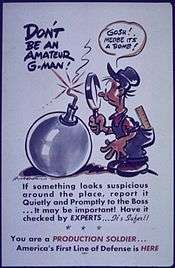G-Man (slang)

G-Man (short for "Government Man") is an American slang term for special agents of the United States Government. It is specifically used as a term for a Federal Bureau of Investigation (FBI) agent.
G-Man is also a term used for members of G Division, essentially a British anti-rebel police unit operating out of Dublin Castle prior to Irish Independence in 1922. Colonel Ned Broy uses the term in his official testimony for the Irish Army's Bureau of Military History in their archive of the Rising and War of Independence.
Use in media
According to the Merriam-Webster Dictionary, its first known use in America was in 1928. The earliest citation in the Oxford English Dictionary for the American usage is 1930 from a book on Al Capone by FD Pasley.
In FBI mythology, the nickname is held to have originated during the arrest of gangster George "Machine Gun" Kelly by agents of the Bureau of Investigation (BOI), a forerunner of the FBI, in September 1933. Finding himself unarmed, Kelly supposedly shouted, "Don't shoot, G-Men! Don't shoot, G-Men!"[1] This event is dramatized in the 1959 film The FBI Story and this dramatization is referenced in the 2011 film J. Edgar. The encounter with Kelly is similarly dramatized in the 1973 film Dillinger.
In the video game franchise Half-Life, one of the main characters is a "sinister interdimensional bureaucrat" called the G-Man, who speaks in a cryptic manner and places the main character Gordon Freeman into stasis at the end of the first game.
In X-Men: First Class, Charles Xavier refers to his team as "G-Men," but Moira MacTaggart says that they are something different like "X-Men." Charles finds that amusing and keeps it.
The Spanish Rock band Hombres G got its name from the Spanish translation of G-Man and after the Movie of the same name. [2]
See also
References
- ↑ "Timeline of FBI History". Federal Bureau of Investigation. Archived from the original on 2006-11-21. Retrieved 2006-11-23.
- ↑ "Hombres G". HombresG.Net. Retrieved 2018-07-08.